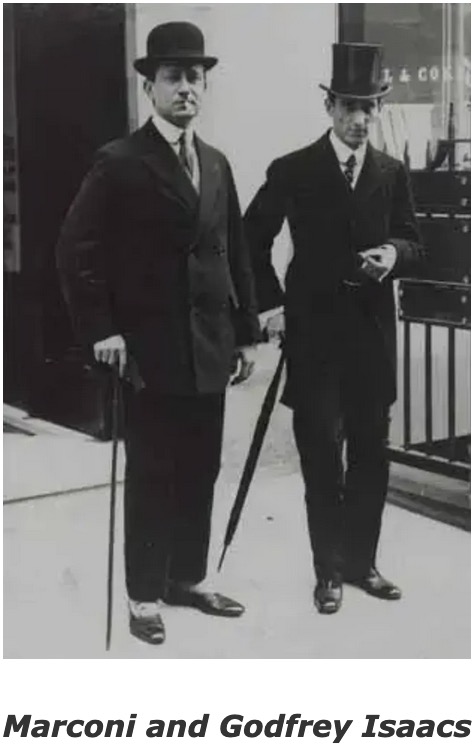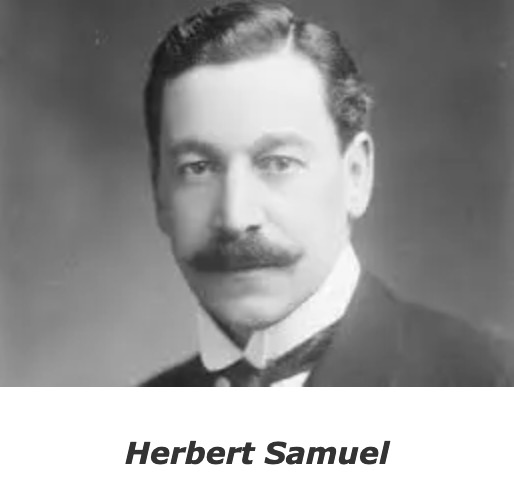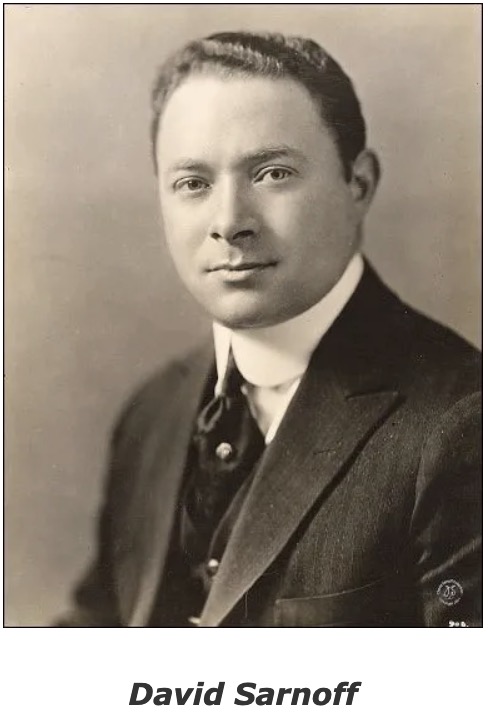This series of posts covering the topic of the unsavoury origins of the BBC is re-posted by kind permission of The Occidental Observer, where the original article can be found in full at this link. This is Part 2 of 4 parts.
Chaos of the ether
The American government and its favoured business partners had effectively nationalised wireless technology to an extent sufficient for the needs of the navy. The private, small-scale use of the same technology was of doubtful legality but had occurred sporadically in both the US and UK after it became possible. The US Secretary of Commerce from March, 1921, Herbert Hoover, a ‘co-operationist’ (between the government and the largest businesses), issued a hopeful decree: “There were … an estimated 14,000 amateur radio operators and in January 1922 the Department of Commerce ordered them to stop sending signals[.]”. 21 He had already attempted unsuccessfully to deprive small companies of radio licences, but for his purposes the Radio Act of 1912 had been found wanting. Thus “Hoover called his first radio conference in Washington DC from 27 February to 2 March 1922 to ask for industry advice on regulation.” 22 David Sarnoff had by then already been a leading ‘industry adviser’ for the best part of a decade and was an advocate for the interests of RCA, which were then largely in manufacturing and selling wireless equipment.
In Britain, according to Asa Briggs, “[d]uring the first years of broadcasting experience it was not distaste for American advertising which influenced the first British critics of American broadcasting, but alarm at the ‘chaos of the ether’ in the United States.” 23 That alarm was carried across the Atlantic by F. J. Brown, the British Post Office’s Assistant Secretary, who attended the conference in February 1922 and transcribed a speech by Hoover. Hoover argued for broadcasting to be distinctly more restricted and centralised than the press and raised the threat of “material of public interest” being “drowned in advertising chatter”, though he “did not say that it was already happening. … The conference recommended an outright ban on ‘direct’ advertising citing a shortage of wavelengths; a decision Brown would highlight upon his return to London.” 24
As Ian McIntyre says, in Britain “…the Wireless Telegraphy Act of 1904 vested the power to license all transmitters and receivers in the Post Office”; the Post Office was not yet licencing any transmission other than occasional experiments. 25 The BBC-approved historian Briggs treats Brown’s portrayal as accurate:
“The multiplicity of radio stations and the scarcity of wavelengths led to interference and overlapping, ‘a jumble of signals’ and a ‘blasting and blanketing of rival programmes’. Even in America itself, despite its tradition of free enterprise, there was pressure for government ‘policing of the ether’. The government’s powers… were quite inadequate to control the new medium. A few Americans were even tempted to look with approval on the British Post Office.” 26
Yet, according to David Prosser, who attends more closely to the details,
“ ‘…so-called interference by amateur radio operators was exaggerated’. The real problem was that early radio transmitters could not adhere to a wavelength with any degree of accuracy and receivers similarly tended to drift.” 27
Interference among stations appears to have been imaginary at the time Brown reported back. “Reports of actual interference between stations would not appear until October (by which time negotiations to establish the BBC were concluded), and then only on one occasion in New York.” 28 Brown himself reported hearing radio in America without interference. “That Brown was ‘certain’ stations interfered with one another, yet what he heard was ‘quite clear’, remains a puzzle. Pressed on this question in later evidence to a parliamentary committee, Brown admitted ‘chaos’ may have been an exaggeration but ‘experts’ had assured him ‘there was a good deal’.” 29
The ‘chaos of the ether’ was less an empirical statement than an implicitly normative one based on growing opposition among businessmen and politicians to competition; the “tradition of free enterprise” mentioned by Briggs had already been partially supplanted by ‘progressive’, cartelist ‘co-operation’ from Morgan, Rockefeller, Kuhn, Loeb and other major business interests and politicians since at least the turn of the century. 30 To allow a market in broadcasting would go against their wishes. Additionally, from the start, the manufacturers of wireless equipment were important military contractors. The broadcasting operations established on either side of the Atlantic became seen as strategic assets by the state, as became especially evident in the Second World War.
Difficulty of selection
According to Prosser, when Brown returned to London, he found that “the Postmaster General faced mounting pressure from manufacturers and amateur enthusiasts to allow regular broadcasting. … By April, twenty-four firms had applied for transmitting licences”. Brown anonymously briefed The Times, saying that “…wireless has become a ‘perfect craze’ with ‘a great deal of mutual interference between stations … [that] the [U.S.] Government has had to appoint a committee with a view to imposing restrictions’.” 31
Brown’s selective reporting helped make the case for a highly restrictive application of the broadcasting laws in Britain, the likes of which Hoover wanted for the USA but was at that time unable to secure. Briggs attributes to Brown’s advice an answer by his superior, the Postmaster-General, Frederick Kellaway, in Parliament in April 1922.
Kellaway asserted that “a large number of firms broadcasting … would result only in a sort of chaos” which would compel him “to lay down very drastic regulations indeed for the control of wireless broadcasting”, which, nevertheless, Kellaway said was “what we are now doing at the beginning”. 32 The deception succeeded. “Within three weeks, the Wireless Sub-committee agreed that broadcasting should be allowed between the wavelengths 350-425 metres from 5 PM – 11 PM weekdays and all day on Sundays and the decision was made that advertising should be prohibited.” 33 “[N]ews not previously published in the Press” would “be banned”. 34 Most aspiring broadcasters were ruled out. “In early May, Kellaway announced that a ‘limited number of radio telephone broadcasting stations’ were to be permitted, but this time added that only ‘bona fide manufacturers of wireless apparatus’ were invited to… ‘cooperate’,”,a euphemism for forming a cartel. Kellaway stated that, faced with “the difficulty of selection” among applicants, limiting the number of providers was necessary. 35 Thus, in the first place, “the problem to which a monopoly was seen as a solution by the Post Office was one of Civil Service administration. The view that a monopoly in broadcasting was better for the listener was to come later.”36
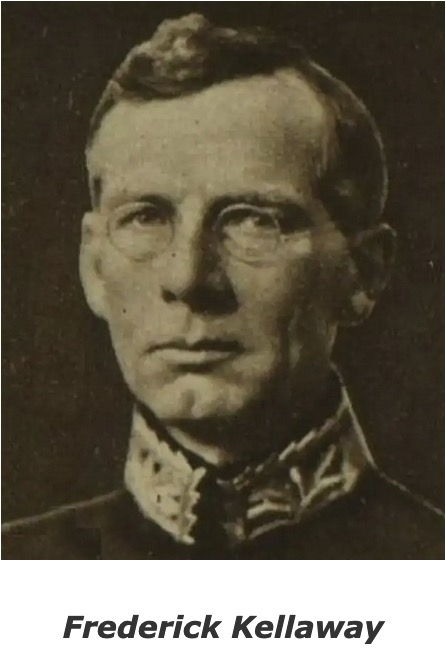 Kellaway stated that he wanted “no danger of monopoly”; Prosser says this was an allusion to “Marconi’s market dominance”. 37 A statement from Godfrey Isaacs in April had implied that he expected or intended that Marconi would be granted sole control of broadcasting, probably because of its patents. 38 This did not eventuate, but at any rate, as Ronald Coase says, “the manufacturers’ main interest was not in the operation of a broadcasting service but in the sale of receiving sets” 39 The scheme soon to be agreed on and approved by the Post Office would oblige the public to buy from an approved list of suppliers. As McIntyre says, “[t]he origins of British broadcasting … were almost purely commercial” in that the manufacturers’ profits were a priority.40
Kellaway stated that he wanted “no danger of monopoly”; Prosser says this was an allusion to “Marconi’s market dominance”. 37 A statement from Godfrey Isaacs in April had implied that he expected or intended that Marconi would be granted sole control of broadcasting, probably because of its patents. 38 This did not eventuate, but at any rate, as Ronald Coase says, “the manufacturers’ main interest was not in the operation of a broadcasting service but in the sale of receiving sets” 39 The scheme soon to be agreed on and approved by the Post Office would oblige the public to buy from an approved list of suppliers. As McIntyre says, “[t]he origins of British broadcasting … were almost purely commercial” in that the manufacturers’ profits were a priority.40
Formation of the company
The Marconi company was ideally positioned to be the prime beneficiary of the Post Office’s scheme. Isaacs, more than anyone else, also determined what the scheme would be at a meeting of the ‘Big Six’ manufacturers in May 1922. A written account of the meeting was only discovered or revealed in 2018 and, according to Prosser, “[a]lthough the meeting was chaired by Sir Evelyn Murray, the Secretary of the Post Office, it is Godfrey Isaacs, the managing director of Marconi, who emerges from the pages of this transcript as the dominant force in the room.” 41
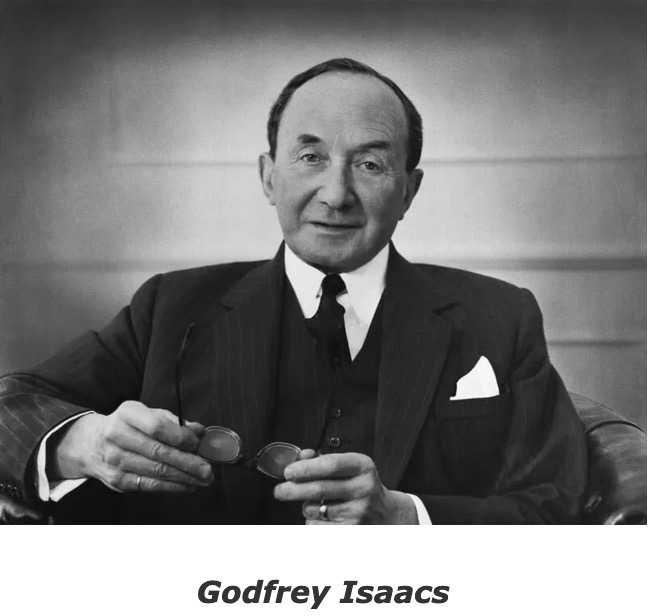 Contrary to myths prevailing before the transcript was discovered, the Post Office “was prepared to issue multiple licences”, or at least to allow discussion along such lines, and “Metropolitan Vickers, the Manchester-based company formed out of British Westinghouse and still associated with its American former owner, resisted the idea of a single provider and called for competition”. 42 ‘Met-Vick’, “along with the Radio Communication Company … and the Western Electric Company … constituted the nucleus of a possible ‘second group’.” The ‘first group’ comprised Marconi, the General Electric Company plc (unrelated to the US firm of similar name), and British Thomson-Houston. As Briggs says:
Contrary to myths prevailing before the transcript was discovered, the Post Office “was prepared to issue multiple licences”, or at least to allow discussion along such lines, and “Metropolitan Vickers, the Manchester-based company formed out of British Westinghouse and still associated with its American former owner, resisted the idea of a single provider and called for competition”. 42 ‘Met-Vick’, “along with the Radio Communication Company … and the Western Electric Company … constituted the nucleus of a possible ‘second group’.” The ‘first group’ comprised Marconi, the General Electric Company plc (unrelated to the US firm of similar name), and British Thomson-Houston. As Briggs says:
“There were definite business links between the Marconi Company, GEC, and BTH. The Marconi Company and GEC jointly owned a valve-manufacturing company, while BTH, linked with the American General Electric Company, had a common interest with the Marconi Company through the Radio Corporation of America and a patent-sharing agreement.” 43
The Marconi group had the trump card. “Isaacs made clear that he didn’t believe a ‘transmitting station can be erected to work efficiently’ without using Marconi patented technology, which he would only make available to a single scheme.” 44 The strongest concurrence to Isaacs’ view came from Hugo Hirst (born Hugo Hirsch), chairman of GEC, which he had co-founded with his fellow Jewish immigrant from Germany, Gustav Binswanger. 45 After strenuously protesting, Metropolitan Vickers, the last resisters, “[fell] into line behind a single scheme” in June.46
Isaacs also successfully demanded a licence fee scheme that would guarantee revenue for the manufacturers. Thus “[w]hat emerged was a single broadcaster operating at arms-length from the Post Office providing a ‘public service’ with national content shared between regional stations, funded by a licence fee with advertising prohibited.” 47 Historian of the Marconi company Tim Wander credits Isaacs with “deftly negotiat[ing] a coming together of the disparate wireless-producing companies … in order to create the new British Broadcasting Company” and lauds him as “[t]he man who made the BBC”. 48
Footnotes
21 Marconi Proposes, David Prosser, Media History, Volume 25, Number 3, p5
22 Prosser, p3
23 The Birth of Broadcasting, Asa Briggs, 1961, p64
24 According to Hoover, “…the wireless has one definite field, and that is for the spread of certain pre-determined material of public interest from central stations. This material must be limited to news, to education, to entertainment, and the communication of such commercial matters as are of importance to large groups of the community at the same time. It is, therefore, primarily a question of broadcasting, and it becomes of primary public interest to say who is to do the broadcasting, under what circumstances, and with what type of material. It is inconceivable that we should allow so great a possibility for service, for news, for entertainment, for education, and for vital commercial purposes, to be drowned in advertising chatter, or to be used for commercial purposes that can be quite well served by our other means of communication.” Prosser, p4, 6. “Note also here the morphing of Hoover’s original phrase that it is ‘inconceivable’ that the ether should be used for ‘advertising chatter’ to there being already a ‘mass of “advertising chatter”’.” Prosser, p10
25 The Expense of Glory, Ian McIntyre, 1993, p120
26 Briggs, Birth, p64
27 Prosser, p5. Prosser is a BBC employee.
28 Prosser, p5. “The first issue of Radio Broadcast in May 1922 (published several weeks after Brown’s visit) counted ‘altogether, according to present available information … more than twenty stations which broadcast extensively’.” The magazine described the experience as one of “watching and waiting”, which “does not suggest the editor of Radio Broadcast felt the airwaves were overly congested by this time. In New York, where 15 stations operated on a single frequency, an agreement was reached in July 1922 for allocation of time. Reports of actual interference between stations would not appear until October (by which time negotations to establish the BBC were concluded), and then only on one occasion in New York.”
29 Prosser, p1-2. Brown “…failed to communicate another, and ultimately for American broadcasting, more significant development. Toll broadcasting, defined as ‘broadcasting where charge is made for the use of the transmitting station’…” Prosser, p6
30 See The Progressive Era, 2017, by Murray Rothbard which draws heavily on The Triumph of Conservatism, 1963, by Gabriel Kolko.
31 Prosser, p7-8
32 Briggs, Birth, p67-8
33 Prosser, p8
34 The BBC, Asa Briggs, 1985, p29
35 Coase, Origin, p208. See also Briggs, Birth, p159. The Daily Mail and Daily Express were among newspaper applicants for broadcasting permission. In the 1950s, selection must have ceased to be perceived as a difficulty, as the state selected various private consortia to broadcast alongside the BBC.
36 Coase, Origins, p210. My emphasis.
37 Prosser, p9 and McIntyre, p120
38 “A noteworthy omission in Mr. Isaacs’ statement is that he makes no reference to the repercussions which the Marconi Company plan would have on those of the other companies which desired to start broadcasting or to the problem of how the wavelengths would be allocated between the various companies.” British Broadcasting – A Study in Monopoly, Ronald Coase, 1950, p9
39 Coase, Study, p18-19
40 McIntyre, p120
41 Prosser, p11
42 Prosser p11, 13
43 Briggs, Birth, p108
44 Prosser, p11, 13, 16 and Briggs, Birth, p108
45 Prosser, p12. GEC was originally named after Binswanger.
46 Prosser, p13
47 Prosser, p16
48 Godfrey Isaacs and the BBC, Tim Wander, 2024. “We can identify the exact moment the BBC was conceived. It was not the Post Office that proposed the BBC, but Godfrey Isaacs of Marconi.” Prosser, p16
For the remaining parts of this study, click here for Part 1, click here for Part 3, and click here for Part 4.

